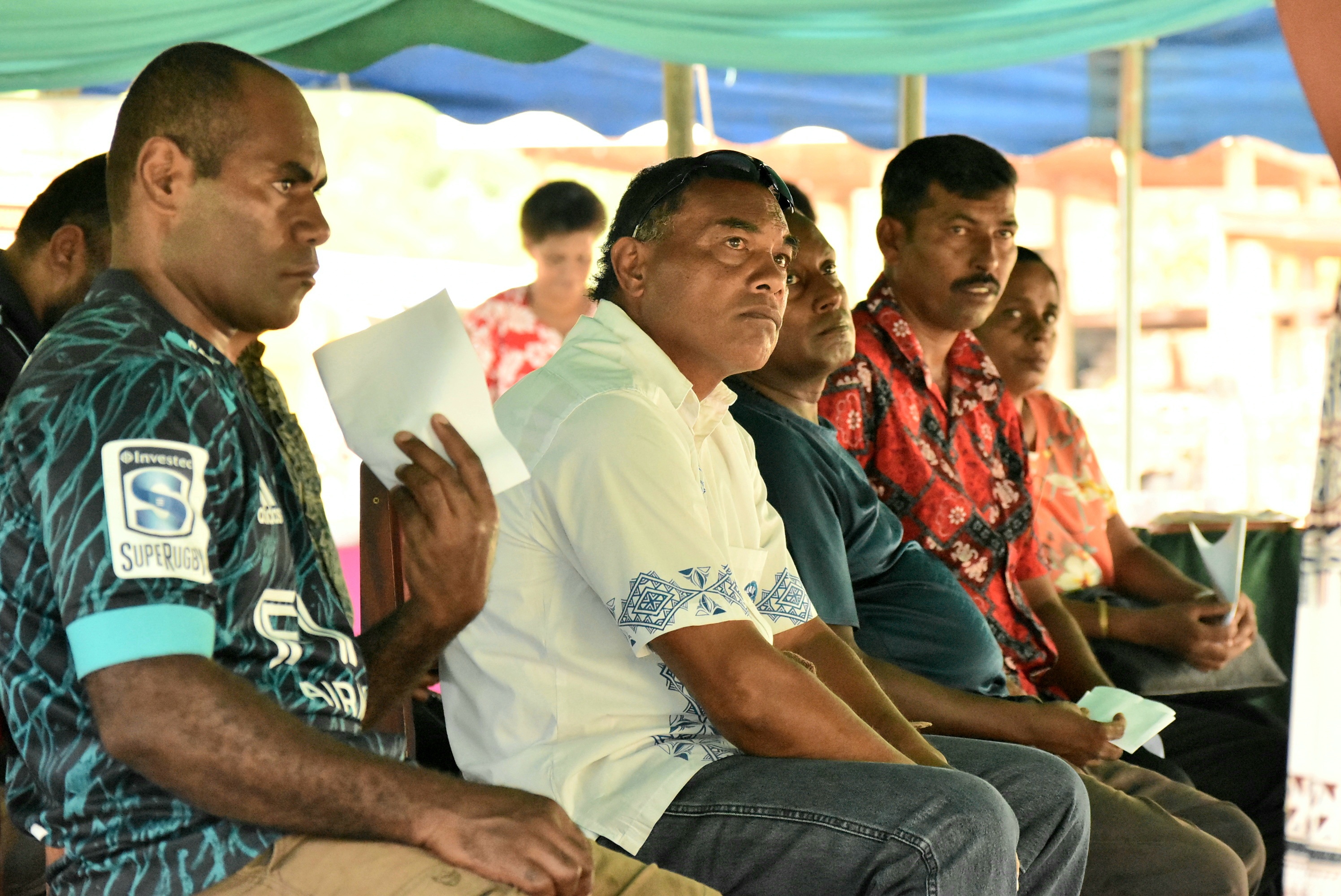Improved Genetic Stock (Breeding Buck's) Released
February 25, 2021

Picture: Goat farmers who received the Breeder Bucks
Improving the genetic makeup of livestock in the country remains a priority for the Ministry of Agriculture in order to help ease the import bill of meat products.
This was reiterated by Minister for Agriculture, Waterways and Environment Hon. Dr. Mahendra Reddy when officiating at the release of Improved Genetic Stock (Breeding Bucks) at the Ministry's Sigatoka Research Station yesterday.
Hon. Reddy said the release of the breeder bucks was a milestone achievement for the local livestock sector as it was an integral component towards improving the genetic material of the stock available amongst local livestock farms.
A common occurrence and issue brought up by livestock farmers around the country was the decreasing size of animals that was reared by farmers, with Minister Reddy highlighting that this issue of decreasing animal size would be addressed by introducing improved genetics.
"The issue of decreasing livestock sizes, be it in poultry, small ruminants etc and their shrinking size is primarily because there is a lot of in-breeding occuring, we are not providing new genetic material and farmers are not able to, for different reasons, bring in new genetic material, new breeders and therefore there is a lot of in-breeding and due to this continued in-breeding among our livestock, this is what is to be expected."
"Today is the beginning of a new era, whereby the Ministry of Agriculture will assist farmers acquire new breeding material, new genetic material so that they can maintain the genetic material of that particular breed," said Hon. Reddy.
He said at the moment, 190,000 tonnes of goat meat was produced locally, with Fiji importing approximately $1million worth of goat meat to meet the local demand, something he shared could be greatly reduced if local goat farmers maximized the strategic advantages available here such as favorable weather patterns and good pastures.
"What this basically means is that we don't need to import that $1million worth of goat meat, but the other thing to keep in mind is that if goat meat is also consumed widely, then goat meat could be a substitute for other meats that we are importing, for example lamb meat, as almost 99 per cent of lamb meat is imported, as it's very widely consumed as well, second only to poultry, so thats the target, thats the vision we have, to substitute as much as possible the meats that are being imported in large quantities such as lamb meat, and if we do that, we will be saving a substantial amount of Fiji's foreign currency because we are importing almost all of our lamb meat," he said.
He reiterated that to do so, it was imperative that small scale farmers transition towards commercial farming and that the correct breeds were put in farms to improve the genetic make up of the stock in livestock farms, and through Governments support, all farms would receive fencing material to develop their pastures, which would be provided gradually as this was the basic pre-requisites towards such transitions.
Thirty-one F1 cross goat breeds were released yesterday to identified livestock farmers at a discounted price to help them develop their respective goat farms.
"Of course the farmers will have to pay, they will pay 20% less than the market rate, the live weight market rate is anywhere between $10-$14 live weight, so we'll take the base weight price, which is $10 per kg, and we will reduce it by 20%, that's the methodology we have so we are giving it out at $8.00 per kg for live weight and this is what farmers will pay.
"We cannot give it out for free because we want you to value these bucks, we've noticed that in the past, such assistance when given out free wound up being misused, and used for other purposes other than its intended purpose because we want you to take ownership of it and we're doing this to support the farmers by giving these breeders to you at a discounted base price," said Hon. Reddy.
Meanwhile, Uciwai goat farmer Mr. Waisea Saqasaya said the release of the breeder bucks was a relief for him as it would help to improve his stock size.
"My goats are the usual breeds that are available in Fiji, it's usually termed as junglee because the size of my goats are very small, I am very grateful to the Ministry for considering me to be a part of this release of the breeder bucks, I am looking forward to growing my stock and seeing a big difference in my production levels," said Mr. Saqasaya.
Echoing Mr. Saqasaya's sentiments was Korovuto, Nadi goat farmer Mrs. Litiana Rakavidi Ali who had plans to develop her goat farm and produce goat milk on a commercial scale.
"My husband and I are fortunate to be a part of this initiative, as I want to rear more goats because I have major plans to be a consistent supplier of goat milk for the market, there is a huge market for goat milk and this breeder buck assistance will surely go a long way towards me realizing my goal," said Mrs. Ali.
Additionally, the release of these genetically improved bucks will assist in improving the blood line of existing does on the farm thus improving the production and productivity of farms.
The F1 Breed, which is a cross between Boer and Anglo Nubian breeds was released to the farmers, and after one year of mating, other identified farms will receive these breeds as an exchange programme will be implemented to counter the issue of in-breeding by transporting the pure breeders to another farm to improve the genetic material at those other farms, otherwise, the exercise of releasing these improved genetic stock via these breeder bucks would be a futile exercise.
-Ends-
